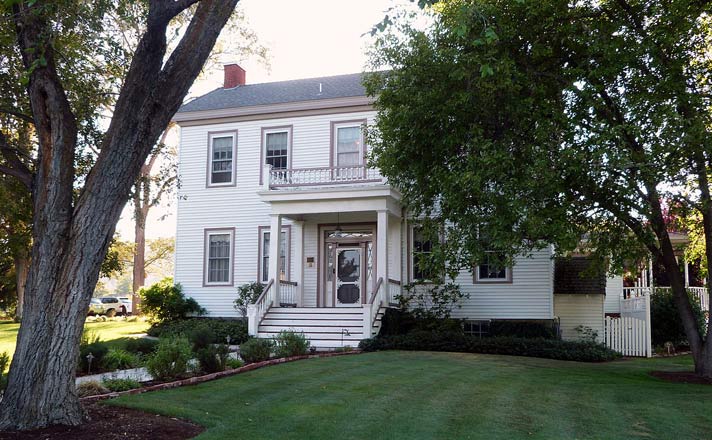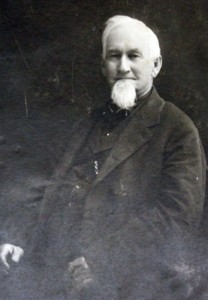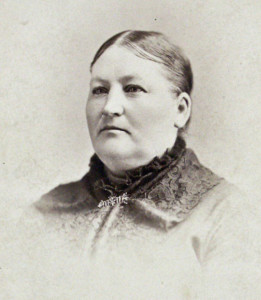Pioneer Profiles – July 2018
Among the Rogue River Valley’s early settlers, there was no more extensive land owner than William Bybee. According to the 1904 Portrait and Biographical Record of Western Oregon, Bybee could claim “the distinction of having owned at different periods more than half of Jackson County” and his interests were characterized as being synonymous with the region. Bybee had come a long way from his roots.
Born in 1830 on a farm in Clark County, Kentucky, Bybee “was the recipient of but a meager education.” His father was one of the biggest livestock dealers in Kentucky and Bybee spent most of his youth as a drover for his father, herding bands of hogs, cattle and sheep to markets in Virginia and South Carolina.
But young Bybee had ambitions beyond Kentucky, and at the age of 20 he set out to seek his fortune. For about six months he worked for the government transferring freight from Missouri, to Mexico; then he accompanied a train of government supplies to Kansas. “Having an intense desire to go further west and try his fortune of the Pacific slope,” Bybee and eight others “provisioned an outfit of several wagons, drawn by mule teams and started for the far west in the spring of 1852.” The group wintered in Diamond Springs, California, where they tried prospecting and mining “with only fair success.” In the spring they moved on to Portland where they remained for about a year.
Bybee arrived in Jackson County in the spring of 1854. He briefly tried his hand at mining before joining Captain Jesse Walker’s company of volunteers protecting settlers from the raids of angry Indians. Walker, a prominent army man, had previously led an earlier army of volunteers into the Klamath Lake country to defend newly-arriving immigrants from Indian attacks.
Walker had brought his family across the Oregon Trail in 1847 and taken up a donation land claim about a mile north of Jacksonville. In November of 1854, Bybee married Walker’s daughter, Elizabeth Ann, and purchased some land from his new father-in-law to build a cabin for his bride. One year later, Captain Walker died and left the remainder of his holdings to his daughter and son-in-law. This real estate was the foundation of Bybee’s fortune.
For the next forty-one years, Bybee’s primary business was stock-raising. He “bought nearly all the hogs raised in the Rogue River Valley,” then drove them to the mining camps in Northern California and Nevada where he “sold them to local butchers and to Chinamen.” According to a 1905 issue of the Rogue River Courier, Bybee claimed that his drover days were the most enjoyable of his life. “With a band of from 200 to 600 head of hogs and teams hauling feed…and half a dozen men to assist him, he would start for the California mining camps. Some of his trips over the Siskiyou mountains were far from a pleasure jaunt. On one of these trips he had to break a trail with horses through four feet of snow for his hogs to travel on.”
Bybee invested most of his profits from stock raising into real estate. Prior to his father-in-law’s death, he had increased his home farm acreage by 1700 acres. Additional acquisitions included 2900 acres in the Rogue River region, 1560 acres along Antelope creek, and 500 acres along Evan’s creek. This latter property was noted for its mineral springs. On each property, Bybee built a ranch home and hired a couple to supervise the property’s operation.
However, Bybee’s heavy investments in improving his acreage left him “land poor.” In 1881, the Ashland Tidings reported that Bybee was forced to sell Alex Martin “all his real estate and personal property, including 5,500 acres of land, with all improvements, live stock, etc.” for the sum of $26,000. When his daughter Effie married Charles Prim that year, instead of the traditional gift of silver or crystal, Bybee gave them a hog.
A year later, Elizabeth took the precaution of legally filing a married woman’s separate property claim, identifying assets that would not be subject to her husband’s liabilities. She claimed two jackasses, 2 stallions, 30 head of horses, 30 head of mules, 63 head of cattle, 1,400 head of sheep, 150 head of hogs, plus wagons, agricultural implements, and half interest in a thresher.
Bybee’s fortunes apparently continued to wax and wane. In a park-like setting not far from his home, Bybee built a mile-long racetrack and a grandstand that could seat 600. He made this property available for various community events including county fairs, Fourth of July celebrations, and ice-cream socials. However, at the turn of the century, newspapers reported that Beekman and Reames sold the mortgage on Bybee’s vast west-side property in order to avoid foreclosure. A few years later, some 1240 acres of rich bottom land containing a pear orchard, farming tracts, and valuable forest were sold off.
In his heyday, however, Bybee’s business interests were extensive: he owned a fording and ferry service across the Rogue River; he operated a resort at Evans Creek; he operated a placer mine in Josephine County and built one of the longest mining ditches in Southern Oregon; he grew mission grapes in Jacksonville. He was active in the Democratic Party and in 1878 was elected sheriff of Jackson County and served two terms. He was also a member of the Independent Order of Odd Fellows.
Bybee was described as “an earthy, virile man.” Reportedly, his “amatory abilities even exceeded his ability to acquire land.” His philandering was the subject of much local gossip. Bybee’s wife Elizabeth apparently put up with his “extra-curricular activities” while producing eleven children. Five of the children survived until adulthood; four of them were with Bybee when he died in 1908 “from stomach trouble.” At the time of his death, he still owned “several fine farms in Jackson county and other property, among which
The Bybee House, built in 1868, “with its full two stories, and its spacious sitting room, dining room and kitchen and many bedrooms, that ample accommodations might be had for all comers,” still stands on Old Stage Road on the Bybee donation claim one mile north of Jacksonville. Today it is a popular bed and breakfast inn.


